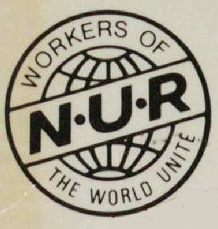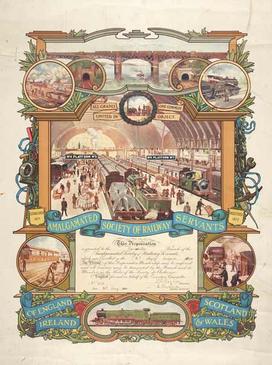Related Research Articles
In British politics, an affiliated trade union is one that is linked to the Labour Party. The party was created by the trade unions and socialist societies in 1900 as the Labour Representation Committee and the unions have retained close institutional links with it.
The British Seafarers' Union (BSU) was a trade union which organised sailors and firemen in the British ports of Southampton and Glasgow between 1911/1912 and 1922. Although of considerable local importance, the organisation remained much smaller and less influential at a national level than the National Sailors' and Firemen's Union, (NSFU).

The National Union of Seamen (NUS) was the principal trade union of merchant seafarers in the United Kingdom from the late 1880s to 1990. In 1990, the union amalgamated with the National Union of Railwaymen to form the National Union of Rail, Maritime and Transport Workers (RMT).
The National Union of Ship's Stewards, Cooks, Butchers and Bakers was the principal trade union for service personnel serving aboard British merchant ships between 1909 and 1921.
The Amalgamated Marine Workers' Union (AMWU) was a trade union of sailors, firemen and ship-board service personnel which existed in the United Kingdom between 1922 and 1927.

The National Union of Railwaymen was a trade union of railway workers in the United Kingdom. The largest railway workers' union in the country, it was influential in the national trade union movement.
The National Transport Workers' Federation (NTWF) was an association of British trade unions. It was formed in 1910 to co-ordinate the activities of various organisations catering for dockers, seamen, tramwaymen and road transport workers.
New unionism is a term used to describe moves to broaden the trade union agenda. It has been used twice in the history of the labor movement. Ben Tillett was a prominent leader of the London Dock strike of 1889. He formed the Dock, Wharf, Riverside and General Laborers' Union in 1889, which had support from skilled workers. Its 30,000 members won an advance in wages and working conditions.
The 1911 Liverpool general transport strike, also known as the great transport workers' strike, involved dockers, railway workers, sailors and other tradesmen. The strike paralysed Liverpool commerce for most of the summer of 1911. It also transformed trade unionism on Merseyside. For the first time, general trade unions were able to establish themselves on a permanent footing and become genuine mass organisations of the working class.
The National Maritime Union (NMU) was an American labor union founded in May 1937. It affiliated with the Congress of Industrial Organizations (CIO) in July 1937. After a failed merger with a different maritime group in 1988, the union merged with the Seafarers International Union of North America in 2001.
The International Seamen's Union (ISU) was an American maritime trade union which operated from 1892 until 1937. In its last few years, the union effectively split into the National Maritime Union and Seafarer's International Union.

The Amalgamated Society of Railway Servants (ASRS) was a trade union of railway workers in the United Kingdom from 1872 until 1913.
Firemen and Deckhands' Union of New South Wales (FDU) was an Australian trade union existing between 1901 and 1993. The union covered deckhands employed on ferries, tugs, launches, lighters and hoppers, as well as enginemen, wharf hands, turnstill hands, change hands, firemen, motorboat coxmen and assistants. The FDU operated a closed shop, with all labour in the industry provided to employers through the union.
The 1913 Sligo Dock strike in the port of Sligo in northwest Ireland was a labour dispute lasting 56 days from 8 March to 6 May 1913. During the strike, there were numerous clashes on the docks and riots in the town, resulting in one fatality. Occurring six months earlier than the Dublin Lockout, it was regarded as a precursor to that action and a successful application of the Irish Transport & General Workers Union’s strategy for workers rights by James Larkin and James Connolly. It resulted in victory for the workers. James Larkin considered the 1913 victory in Sligo to be a major achievement of the ITGWU.

Edward Tupper was a British trade unionist active in the National Sailors' and Firemen's Union, who was particularly prominent in the 1911 strike in Cardiff.
The Leith dockers strike of 1913 was a strike of the dockers of Leith, Edinburgh, Scotland, from 26 June to 14 August 1913. The Dockers were part of the National Union of Dock Labourers (NUDL) union. The strike is said to have brought Leith to a standstill.
The Irish Seamen and Port Workers' Union, an Irish trade union, was founded in 1933.

George Watson MacGregor Reid was a Scottish modern Druid who established and led the Church of the Universal Bond.
John Robert Bell was a British trade unionist and political activist.
The Swedish Sailors' Union was a trade union representing sailors from Sweden.
References
- ↑ Smethurst, John B.; Carter, Peter (June 2009). Historical Directory of Trade Unions. Vol. 6. Farnham: Ashgate Publishing. p. 184. ISBN 9780754666837.
- ↑ Yann Belliard, "Bell, John Robert", Dictionary of Labour Biography, vol.XV, pp.14–23
- ↑ "Hull Seamen's Union". Modern Records Centre. University of Warwick. Retrieved 14 November 2020.